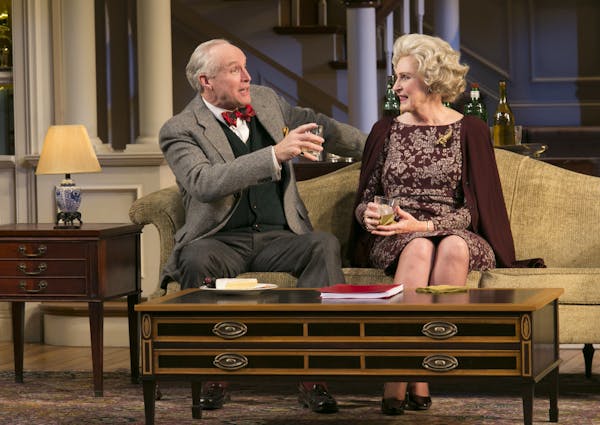A simple play script occupies center stage throughout the Guthrie's production of A.R. Gurney's "The Cocktail Hour." It's referred to, cursed at and criticized as it lies inanimate on a coffee table, but no one ever actually reads it. No one needs to, since the action the script details is taking place onstage all around it.
The onstage script around which Gurney's wry and self-referential comedy of manners revolves is also entitled "The Cocktail Hour." The playwright, John (standing in for Gurney himself), has brought it to his family because it's semi-autobiographical and he would like their blessing before having it produced. His elderly parents are horrified at the thought that their privacy would be breached; his sister Nina is enraged at having only a minor role in the drama. Over the course of an extended cocktail hour, small family dramas and squabbles play out, culminating in the revelation of a closely-held secret.
The well-mannered echelons of WASP society are familiar Gurney territory, and the Guthrie's production, under Maria Aitken's direction, conjures this world with grace and humor.
Peter Thomson gives a vibrant and detailed performance as John's father, Bradley, bringing plummy-voiced charm and good humored condescension to the role. His Bradley is clearly a man who's comfortable with his sense of entitlement, but Thomson never allows the role to become a caricature.
After a tentative start, Kandis Chappell warms into her role as Bradley's wife, Ann, providing some nice moments as she tries to convince her son to write a book instead of a play ("books aren't quite so public") and laments the shortage of good domestic help, all while downing several martinis. Charity Jones turns in a nicely modulated performance as older sister Nina, whose petulance covers a heartfelt yearning for a different life.
Rod Brogan tackles the most challenging role as John, in part because he's a thinly veiled stand-in for Gurney himself and, as such, is as much an orchestrator of the action as he is a character. Brogan juggles this duality with skill, lending the role an acerbic edge tempered by honest affection for the family he's intent on skewering.
Aitken keeps the pacing crisp as the play unfolds and adds some wry touches, such as pulling back the curtains at the end of the first act to reveal the mechanics of James Youmans' beautifully realized box set.
All in all, it's a well-honed production of a play that doesn't offer earth-shattering revelations, but rather a pleasant, humorous and occasionally intriguing interlude from the everyday. Just as a good cocktail hour should do.
Lisa Brock writes about theater.
In heated western Minn. GOP congressional primary, outsiders challenging incumbent

Minnesota Sports Hall of Fame: A class-by-class list of all members

This retired journalist changed professional wrestling from Mankato

